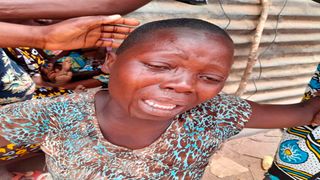
Ms Saumu Sodama from Kwale County whose children were killed by hyenas.
| PoolKwale
Premium
‘I’d rather die of hunger with my other children,’ cries mother of babies mauled by hyenas
Ms Saumu Sodama woke up early in the morning and rushed to the nearby market in Baisa village, Kinango, Kwale County, to look for casual jobs, so that her children, whom she had left at home, do not go hungry.
A few hours later, at 9.30am, she received a call from her neighbour.
What she heard sent her flying back home, her heart in her mouth, fear giving her almost supernatural speed — hyenas had sneaked into her compound, and two of her children had been attacked, her neighbour had told her.
"When I arrived, I found my 2-year-old son had been attacked and eaten by a hyena. He was badly mauled I could barely recognise him," said Ms Sodama.
“I found him lying in the house in a pool of blood, while villagers were out pursuing the animals. The situation was bad, and I only hugged him without uttering a word.”
Nearby, the boy’s one-year-old sister lay lifeless.
Still confused
Ms Sodama, who is still confused, has now vowed to stay in the house to take care of her other children – a boy, 6, and a girl, 4.
"I would rather die of hunger with my remaining children in the house, than leave them behind since wildlife have proved to be more lethal than hunger.”
During the Tuesday morning incident, the hyenas also attacked a 65-year-old man who was in the homestead, together with four villagers who had rushed to the compound to help. They were admitted to Kinango Sub-County Hospital.
One hyena killed
The villagers pursued the hyenas and killed one of them.
Baisa village is predominantly pastoralist. Sparsely populated and with semi-permanent houses, the village is about 40 kilometres from the Tsavo East National Park.
The hyenas attacked when most of the villagers had left to graze their animals in a forest that is adjacent to the park.
Ms Sodama’s house is in the farthest corner of the village and is surrounded by shrubs. The homes are roughly 500 metres apart.
When the Daily Nation team visited Kinango Sub-County Hospital, it encountered several people nursing injuries inflicted by wild animals, ranging from those trampled by elephants to those gored by buffaloes.
The Kenya Wildlife Service (KWS) acting assistant director in charge of the Coast conservation, Ms Lilian Ajuoga, said more officers would be deployed in areas identified as high risk, including Kinango, on Thursday.
Sh30,000 for family
“In the meantime, we shall give the affected family Sh30,000 for each of the children killed, as a consolation, while we process their compensation,” said Ms Ajuoga.
Chengoni Sub-Chief Jackson Chengo said the hyenas had also attacked two people on Monday night in another village nearby. They were taken to Samburu hospital where they were treated and discharged.
Kinango Sub-County Police Commander Fred Ombaka confirmed the Tuesday attack and said officers were working with the KWS to contain the animals and reduce cases of human-wildlife conflict.
“We are doing what we can to contain the situation, which has been caused by drought,” said Mr Ombaka.
The bodies of the two children were taken to Kinango Hospital mortuary, pending post-mortems.
Human-wildlife conflict
Perennial human-wildlife conflict in various counties in Coast region has been deepened by the ongoing drought, which has led to the local community keeping children at home rather than send them to school hungry. The adults also have to return home before dark for fear of being attacked by animals.
Lack of water has pushed wild animals, particularly elephants and hyenas, to roam around villages.
“As a result of drought, wildlife no longer fear any tricks we use to scare them, they no longer fear the sirens, LED flashlights or the beating of drums, they just follow us, with KWS doing very little to contain the animals,” said Mr Karissa Juma, a Kinango resident.
Marauding elephants in villages have led to more than 30 schools in three coastal counties to be shut down.
Schools that are affected in Taita Taveta County include Mgeno Primary, Mbele Secondary, Mbele Primary, Miasenyi Secondary, Miasenyi Primary, David Kayanda Secondary, Mbulia Primary, and others in Kishushe, Jipe and Tausa areas.
In Tana River County, Assa, Wayu, Titila, Idi and Odoganda primary schools have been closed as result of drought, with children walking long distances in search of water.
Lamu leaders have confirmed schools in Witu, Pandanguo, Moa, Dide Waride, Hindi, Mavuno, Poromoko and Bar’goni, in Lamu West, and Basuba, Milimani, Mangai, Mararani, Kiangwe, Ishakani, Kiunga, Bahamisi and Madina, all in Lamu East, have been closed as a result drought and the wildlife menace.





